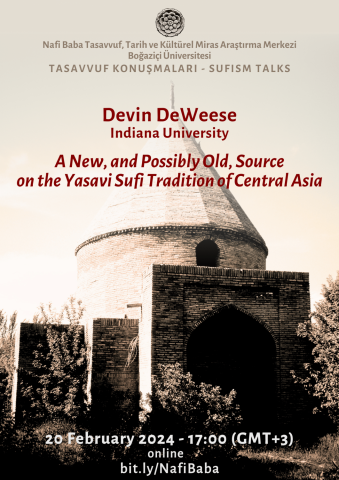A New, and Possibly Old, Source on the Yasavī Sufi Tradition of Central Asia

You are cordially invited to the upcoming lecture in the Nafi Baba Sufism Talks Series titled "A New, and Possibly Old, Source on the Yasavī Sufi Tradition of Central Asia" by Devin DeWeese. Please find attached the announcement poster.
The talk is scheduled to be held online on February 20 at 17:00, accessible via the following link: bit.ly/NafiBaba.
ABSTRACT
This presentation will discuss a Turkic Sufi treatise ascribed to Ismāʿīl Ata, a prominent figure of the Yasavī tradition from the early 14th century; it is a ‘new’ source in that it has not been discussed before, and there is good reason to suppose that it may also be quite old. Whenever it was produced, to be sure, it is certainly among only a handful of Turkic-language works produced within the Yasavī tradition, and deserves attention for this reason alone. The evidence for its antiquity includes a curious passage with which the treatise begins, framed as a ḥadīth, that is otherwise known only from a rare Kubravī source from the late 16th century; its mention of a disciple of Ismāʿīl Ata who is also mentioned as such in a later hagiography based on a lost source produced within an Ismāʿīl Atāʾī Sufi lineage; and, especially, its anomalous account of the transmission of the khirqa, or Sufi robe, received by Aḥmad Yasavī and passed on to his spiritual descendants, an account that further complicates the thorny question of the identity of Aḥmad Yasavī’s Sufi masters and the origins of the Yasavī silsila. Although the treatise cannot be shown conclusively to be an authentic work from the early 14th century, the evidence explored here suggests that it may indeed go back to an early phase of the Yasavī tradition, and may indeed preserve a version of a treatise reliably ascribable to Ismāʿīl Ata or to his circle of disciples.
BIO
Devin DeWeese is Professor Emeritus in the Department of Central Eurasian Studies at Indiana University; he earned his Ph.D. at Indiana University in 1985, and has held fellowships from the National Endowment for the Humanities, the American Council of Learned Societies, the Guggenheim Foundation, and the Carnegie Scholar program. He is the author of Islamization and Native Religion in the Golden Horde: Baba Tükles and Conversion to Islam in Historical and Epic Tradition (Pennsylvania State University Press, 1994) and (with Ashirbek Muminov) of Islamization and Sacred Lineages in Central Asia: The Legacy of Ishaq Bab in Narrative and Genealogical Traditions, Vol. I: Opening the Way for Islam: The Ishaq Bab Narrative, 14th-19th Centuries (Almaty: Daik-Press, 2013). Following his retirement, he was honored with a Festschrift, From the Khan’s Oven: Studies on the History of Central Asian Religions in Honor of Devin DeWeese, ed. Eren Tasar, Allen J. Frank, and Jeff Eden (Leiden: Brill, 2022). His numerous articles on the religious history of Islamic Central Asia and Iran focus chiefly on problems of Islamization, on the social and political roles of Sufi communities, and on Sufi literature and hagiography in Persian and Chaghatay Turkic.
Son Güncelleme: 23:13:40 - 27.08.2024